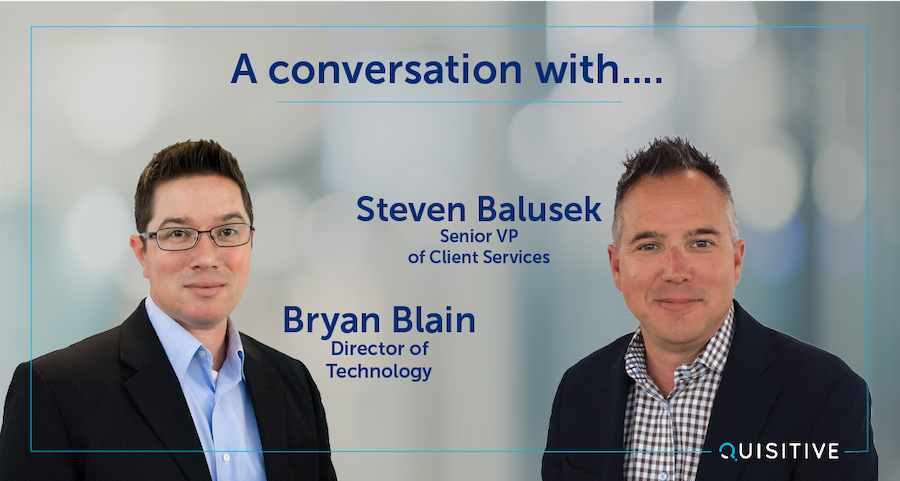Think back to all of those times where you were engaged in conversation and afterward you think back and wish that you would have said something differently or have responded in a different way. Every time this has happened to me in the past I have been aggravated and at the time I always say to myself, okay next time, next time I will get it right. Unfortunately, it is oftentimes too late, especially with those people you only get one shot of being in front of. In a previous blog, I discussed the steps I recognized to jump-start your career and hit the ground running. As time and my role have progressed, I have recognized that beyond the methodologies and ideologies, there is an underlying language that the Quisitive consultants unify around to expresses insight and drive opportunity for clients. Naturally being a part of a smaller sized company, I strive to have the technical acumen to be a part of that unified front. Although looking back over the last several months, there have been many scenarios and conversations where I have struggled to keep up with the “technical talk.” So over the past several months, I have set out to streamline my path towards learning the language.
As a young consultant, I directly correlate the lack of terminology with the lack of experience in my career. However, thinking back to the first time I was irritated with the way I responded to a technical question with everyday blather, I knew there was something that I needed to do. I needed to take control of my learning to successfully position myself within the company. It was at that point that I realized, that an individual can study the words in school all he or she wants, but using them within an organizational setting in the moment of a deep technical conversation is a whole different scenario. To better position myself, there were several steps I took to learn these words I could hear, but not yet say.
The first step I took was actually aside from my daily work and in my daily reading. Through the wide range of articles, I read every day, whether it be business journals, philosophical studies, or the news, there are always a number of words that catch my eye. My advice is to take the second to stop on that word, look it up, and record it. After doing this, eventually, you will find yourself with a long list of words and definitions and begin to ask yourself, how on earth are you to remember all of these words let alone use them in conversation. With multiple so-called trial and error cases, I found it best to take it slow and learn one or two words at a time. You will find yourself talking slower in conversation always thinking of how to place your words, but with time, these complex words will be engrained in muscle memory.
The next step I took may seem like a no-brainer but has proven to be worthwhile along the way. Especially early on, I would be sitting in a meeting and hear words quite often that I had no knowledge of. So, when I heard those words, I would jot them down wherever I could nonchalantly and later add them to my long list but under a “work” category to compartmentalize. Although this is an ongoing effort, this has proven to be one of the most beneficial side activities I have done in work thus far. Perhaps the biggest gratitude I have experienced through this is the appreciation coworkers will share when able to talk at their “same level.”
After practicing this method for some time I eventually realized that there was no point in waiting for the words to come to me and that I could speed this process up. To do that, I directly emailed a number of co-workers across various roles in the organization challenging them with the very question I have been trying to answer all along. What are five unique words, beyond the norm, that you hear on a regular basis in technology consulting? Put differently, what are the words that are subject to our industry that you may otherwise not know? Unsure of what response I might get back, I can’t say I was surprised by the great answers I received back. Below are some of the words that make up the language used daily in technology consulting that you may otherwise not know:
- Greenfield
- SWAG
- Art-of-the-Possible
- Grok
- Burndown
- Seagull Manager
- Pipeline
- Epic
- Renderings
- Datalake
- DevOps
- Staff Augmentation
- Operationalize
- Stakeholders
- SOW (Statement of Work)
- BOM (Bill of Materials)
- ROM (Rough Order of Magnitude)
- MVP (Minimum Viable Product)
- MSA (Master Service Agreement)
- KPI (Key Performance Indicator)
- Herding Cats
- Gold Plating
- Death by a thousand cuts
- Multi-variate Testing
- Post Mortem Meeting
- Low Hanging Fruit
- Digital Transformation
- Digital Disruption
- Scope Creep
- Boil the Ocean
- Critical Path
You may read all of those words, acronyms, and phrases and have all sorts of different reactions but the interesting thing is that they are all correlated in some fashion within Quisitive. Perhaps the most important thing to realize with this is that it is a process that will never end, but is worth being cognizant of. The words we speak on a daily basis are often overlooked but are something worth mastering for they make up essentially everything. The words provided above are only a small fraction of those heard around the office on a normal basis, and learning those will jump start your business role and personal career. To wrap up I challenge those a few years into their consulting career with the same question, what are the words you constantly hear used?

;)


